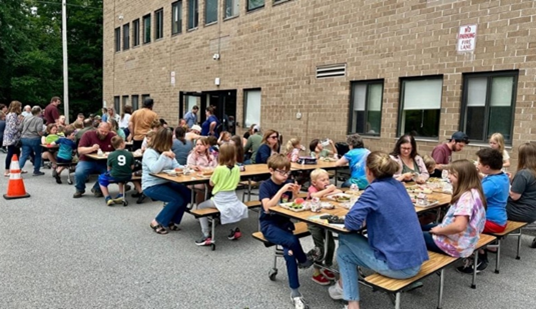The Agency of Education recognizes the importance of partnerships between schools and families to improve outcomes and ensure equity for all students. This page provides parents/families, community members and school districts resources to advance parent/family engagement.
On this webpage, the term family is used rather than parent. We do this to ensure that our language is inclusive of all individuals who are responsible for the care and education of a child. Students may live or be cared for by parents, grandparents, foster parents, siblings, aunts or uncles, or have other non-traditional family structures. By using the term family we hope to make all caregivers feel welcome and included.
Vermont Family Engagement Toolkit and Self-Assessment (FETSA)
The Vermont Family Engagement Toolkit and Self-Assessment is an easy-to-use practical guide for educators seeking to develop and maintain growth of school or Supervisory Union/District family engagement work, including for students with an Individualized Education Program (IEP).
The Family Engagement Toolkit and Self-Assessment is designed to:
- be used in its entirety to assess all family engagement aspects of the system, and
- be completed by teams who have the information necessary to reflect upon the spectrum of family engagement practices within a school (individual teacher level to whole-school initiatives). Teams should have the following membership: administrators, teachers, related service providers, families, and school family engagement coordinators and liaisons, if available.
Resources List
Family Engagement Core Principles
Family and Community Engagement Practice Highlights
Family Engagement Resources Provided by the Agency of Education
Family Engagement Resources from Other Agencies and Providers in Vermont
Family Engagement Resources from Other Agencies and Providers Outside Vermont
Family Engagement Core Principles
Explore each core principle and what each looks like in practice.
Family and Community Engagement Practice Highlights
 The Slate Valley Unified School District (SVUSD) consists of five schools serving the towns of Benson, Castleton, Fair Haven, Hubbardton, Orwell, and West Haven in western Vermont.
The Slate Valley Unified School District (SVUSD) consists of five schools serving the towns of Benson, Castleton, Fair Haven, Hubbardton, Orwell, and West Haven in western Vermont.
SVUSD exemplifies the family engagement core principle of Building Effective Two-Way Communication by having a variety of ways to receive and discuss information. Initiatives include Newsletters, Facebook, Instagram, a Slate Valley Unified App, recent Open House events, clear directions for PowerSchool, and a Community Advisory Council. The Caselton Elementary School newsletter states, “Slate Valley School District’s theme this year is, ‘Our School, Your Future!’ We know that partnering with our families and our community is critical.”
Other engagement strategies to strengthen community belonging and partnership include:
-
In the Fair Haven Union High School Slater Nation Newsletter, families are welcomed, and information is shared to keep all families “in the loop” with information to “help keep informed of upcoming events, show you how to access certain information, and let you know how school is going in general.”
-
Ongoing active outreach and engagement with the community including Coffee and Conversation to discuss the budget and school year, community events and service projects.
Read and learn more about Slate Valley Unified School District (SVUSD) Family and Community Engagement Practice Highlights.
See past Parent, Family and Community Engagement Practice Highlights of Supervisory Union/District and school level exemplars of strategies and systemic practices rooted in Family Engagement Core Principles:
-
Creating a Welcoming Environment
-
Building Effective Two-Way Communication
-
Supporting the Success of Students
-
Sharing Power and Responsibility
-
Partnering with the Community
-
Providing Equity and Access
-
Ensuring Sustainability
Contacts
Please contact the following for questions regarding specific topic(s).
Emanuel Betz, 21st Century Community Learning Centers (After School and Summer Programs)
Tracy Harris, Special Education
Nancy Hellen, Vermont Multi-tiered System of Supports
Stephanie Vogel, Title III, EL State Program Director
Jessie Murray, Title I
Sigrid Olson, Personalized Learning
Michele Johnson, Early Education







